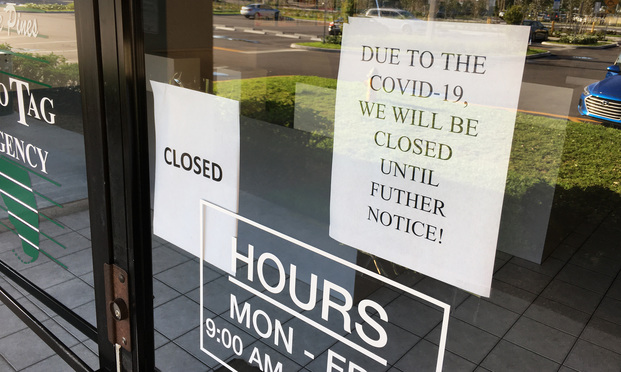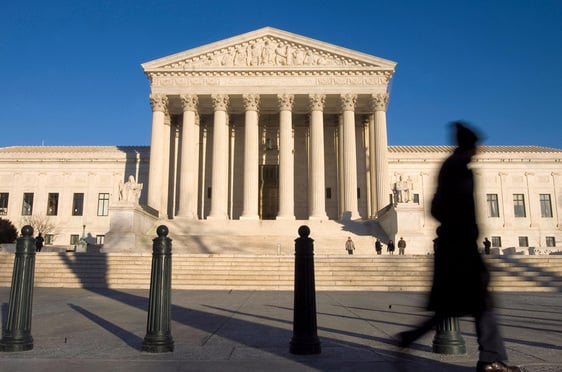
May 14, 2021 | New York Law Journal
Are Rideshare Drivers Subject to the Federal Arbitration Act?In their Arbitration column, Samuel Estreicher, Rex Heinke and Jessica M. Weisel write: "Since the emergence of the gig economy, courts have struggled to fit workers in such businesses into the traditional framework of employment law. One common issue is whether the Federal Arbitration Act (FAA) applies to drivers who work for rideshare companies, Uber and Lyft."
By Samuel Estreicher, Rex Heinke and Jessica M. Weisel
8 minute read

May 14, 2021 | New York Law Journal
Retroactive Insurance Coverage for COVID-19 LossesThe COVID-19 pandemic has presented New York business owners with many obstacles and difficulties, and the New York Legislature has reasonably looked for ways to lessen the financial impact the crisis has had on our neighborhood's restaurants, shops and offices.
By Bryce L. Friedman and Daniel Feder
8 minute read

May 12, 2021 | New York Law Journal
Emerging State-Level Environmental Justice LawsEnvironmental justice has grown in prominence in the political discourse in the last several years. While most of the attention has gone to federal actions, several states have just adopted their own laws to advance it. In their Environmental Law column, Michael B. Gerrard and Edward McTiernan focus on the environmental justice provisions in New York law and those recently enacted by other states.
By Michael B. Gerrard and Edward McTiernan
12 minute read

May 11, 2021 | New York Law Journal
Second Circuit Decides Two Counterfeiting CasesIn their Intellectual Property Litigation column, Eric Alan Stone and Catherine Nyarady discuss 'Tiffany v. Costco,' where the U.S. Court of Appeals for the Second Circuit provided guidance as to the circumstances that may give rise to liability for counterfeiting, as distinct from mere infringement, and 'Omega v. 375 Canal,' where the court addressed liability for contributory infringement for counterfeiting.
By Eric Alan Stone and Catherine Nyarady
9 minute read

May 11, 2021 | New York Law Journal
Realty Law DigestScott E. Mollen, a partner at Herrick, Feinstein, discusses the condominium case "The 277 E. 7th St. Condo v. 277 E. 7th St.," and two landlord-tenant cases: "19 India Fee Owner LLC v. Miller," and "Zorikh Lequidre, Ilse Rumes v. Port Rich Realty."
By Scott E. Mollen
15 minute read

May 11, 2021 | New York Law Journal
Risks and Liabilities Relating to the Emergence of Decentralized Clinical TrialsThe COVID-19 pandemic created an environment to drive the exponential growth of alternatives to traditional, site-based clinical trials such as remote/decentralized trials.
By Nicole Callahan
6 minute read

May 11, 2021 | New York Law Journal
Transit-Related Zoning Programs: Current and ProposedOver two-thirds of subway and commuter rail stations within New York City are not accessible to individuals with ambulatory disabilities or mobility limitations. In an effort to make these stations more accessible, the MTA and the Department of City Planning are currently proposing amendments to the Zoning Resolution. In their Transactional Real Estate column, Peter Fisch and Salvatore Gogliormella discuss programs currently in place and the new accessibility-related initiatives being proposed.
By Peter E. Fisch and Salvatore Gogliormella
10 minute read

May 10, 2021 | New York Law Journal
SCOTUS To Decide If §1782 Discovery Procedures Apply to Private ArbitrationThe U.S. Supreme Court is set to decide a circuit divide over whether U.S. discovery can be obtained for use in private international arbitration proceedings under §1782. The question is whether a private arbitration is a "foreign or international tribunal" within the meaning of the statute.
By Jacqueline Yecies and Christina Hightower
9 minute read

May 05, 2021 | New York Law Journal
Home Court Disadvantage: Change of Venue in Federal Criminal CasesThe Federal Rules of Criminal Procedure have long provided a mechanism to enable a high-profile defendant to seek a change of venue. However, even in cases involving "localized hostility and media bias," judges have been loath to grant such motions. In their Corporate Crime column, Evan Barr and Bryan McIntyre explore the demise of the rule and whether it still serves any purpose.
By Evan T. Barr and Bryan A. McIntyre
12 minute read

May 05, 2021 | New York Law Journal
Incentive Compensation: When a Promise Becomes a MythEmployment contracts typically involve a tension between an employer's desire for flexibility and an employee's desire for predictability. The key for enforceability is to make sure that the written agreement does not permit the employer to take that which it promises to give.
By Michael C. Rakower and Melissa Yang
8 minute read
Trending Stories
- 1DC Lawsuits Seek to Prevent Mass Firings and Public Naming of FBI Agents
- 2Growth of California Firms Exceeded Expectations, Survey of Managing Partners Says
- 3Blank Rome Adds Life Sciences Trio From Reed Smith
- 4Divided State Supreme Court Clears the Way for Child Sexual Abuse Cases Against Church, Schools
- 5From Hospital Bed to Legal Insights: Lessons in Life, Law, and Lawyering



